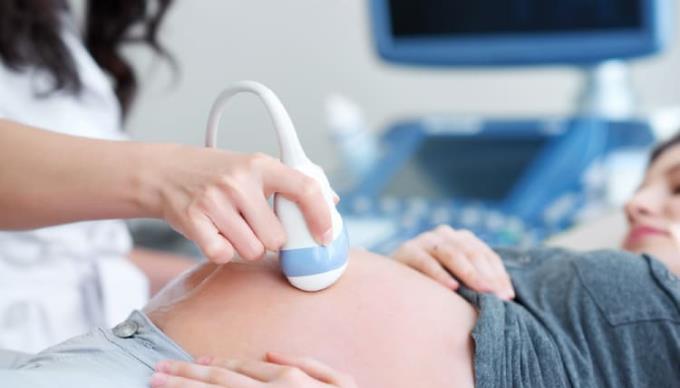Motherhood is a divine gift that the Creator has given especially to women. The course of a 9-month-10-day pregnancy isn't short-lived. From conception to the time the baby is born, pregnant mothers can face a multitude of complications during pregnancy that are at risk of occurring at any time.
Join aFamilyToday Health to learn about complications of pregnancy to better understand the difficulties that pregnant mothers may face in pregnancy and how to handle them promptly.
What are complications of pregnancy?

Pregnancy complications are all possible health problems during pregnancy that are directly related to the health of the mother or fetus or both mother and baby. Complications can occur in healthy pregnant women. For mothers who have had health problems, the risk of pregnancy complications increases.
Pregnancy complications make pregnancy more risky, and the mother will need regular care and monitoring. The reality is that most pregnancies rarely have complicated complications, but at least a good understanding of what can affect their health is what expectant mothers should have. do.
Sometimes there is no clear distinction between complications of pregnancy and the unpleasant symptoms caused by pregnancy. Usually, uncomfortable symptoms do not affect daily activities or cause danger to mother and baby. However, in some cases it is difficult to distinguish these two conditions. The distinction should be based on the severity of the symptom.
For example, the morning sickness pregnant mother typical signs can be mild nausea gravidarum but with complications, the mother will nausea and vomiting sometimes lead to more risk of dehydration and electrolyte is very dangerous.
The 5 most common complications of pregnancy
Here's a list of common pregnancy complications that expectant mothers need to be aware of:
1. Miscarriage

A miscarriage is the loss of a pregnancy that occurs during the first 20 weeks of pregnancy and in medicine it is known by the medical term "spontaneous abortion". More than 80% of miscarriages occur within 12 weeks and up to 10-20% of pregnancies end in miscarriage.
The most common feature of this complication is vaginal bleeding that can be accompanied by abdominal pain and cramps . When you notice these symptoms, you should immediately go to the hospital and notify your doctor or midwife immediately. They will order you for a test or an ultrasound to determine if it is a miscarriage so that timely intervention can be done.
Furthermore, miscarriage is one of the most common pregnancy complications during the first trimester. An estimated 50-70% of miscarriages are thought to be caused by chromosomal abnormalities in fertilized eggs. Sometimes other problems can also lead to miscarriages such as an abnormal embryo or an improperly implanted fertilized egg.
In addition, factors such as age, uterine or cervical problems, a history of birth defects , unhealthy lifestyles such as smoking and drug abuse also contribute to an increased risk of miscarriage.
2. Preterm birth

During pregnancy, regular and regular contractions will help the cervix dilate and widen before 37 weeks of pregnancy . If you give birth before 37 weeks gestation, your baby is called preterm or preterm . Preterm birth adversely affects your baby's development, maybe the baby won't be fully developed or the baby is born with serious health problems.
Some of the symptoms that warn about preterm birth are:
Increased vaginal discharge that is higher than normal
Change in vaginal discharge that may contain blood
Have more than 4 contractions in an hour and may or may not have abdominal pain or cramps
Increased pressure in the pelvic area, the mother will feel like the baby is being pushed down
Low back pain sometimes dull, sometimes also occurs continuously
If you have had a premature birth and your family is waiting for a member, then taking care of your pregnancy in a way that will prepare you for the best health for both mother and baby is something you should care about.
3. Complications of pregnancy: Pre-eclampsia

Pre-eclampsia is considered one of the high-risk pregnancy complications occurring primarily in the third trimester . It should be noted that this pregnancy complication can happen at any time, like in the second half of pregnancy, even six weeks after birth.
Mechanism of hypertension in preeclampsia: the hypothesis of a cell abnormality that causes blood vessels to constrict, causing high blood pressure , possibly even damaging vital organs such as the brain, liver and kidney. Sometimes, in some cases, pregnant women do not have any warning symptoms, which can be life-threatening.
The limited blood flow to the uterus due to preeclampsia causes problems like too little amniotic fluid. This condition can cause small blood vessels to leak fluid into body tissues leading to swelling (edema), and when small blood vessels leak in the kidneys, some protein from the blood can appear in the urine.
Notable symptoms of pre-eclampsia include:
Swelling or puffiness around the eyes
Swelling in arms, legs or ankles
Gain more than 2 kg in one week (usually due to water retention).
However, not all pregnant mothers with symptoms of swelling, edema or weight gain are pre-eclampsia. If there are a few more signs such as severe headache, vision changes , nausea, and vomiting with the above warning signs, do not hesitate to contact your doctor!
4. Gestational diabetes

When it comes to the common complications of pregnancy, it can not be ignored gestational diabetes . This disease occurs in people who have never had diabetes before pregnancy and progress rapidly after.
Gestational diabetes can cause blood sugar to become too high and can seriously affect the unborn baby if it's not caught early. Some of the adverse effects of this complication on the fetus include: hypoglycemic syndrome in the newborn, the fetus at risk of malformations and death, an overweight baby or a respiratory distress syndrome. steaming in babies ...
However, mothers having gestational diabetes have a 25-50% chance of turning into type 2 diabetes . If you do not want to fall into this situation, you need to strictly follow a reasonable meal plan as well as have a healthy lifestyle.
To ensure the health of both mother and baby, doctors will usually order you to have blood sugar tests from 24 weeks to 28 weeks of pregnancy.
5. Infections during pregnancy

The fetus and the pregnant mother always have a special connection, the mother eats what she eats and even the mother is not protected well, the baby is also difficult to avoid danger. Infection is also one of the complications that occur during pregnancy that pregnant women should be aware of. Pregnant mothers are infected with certain types of bacteria or viruses that can harm both the mother and the baby with consequences such as birth defects in the baby. Pregnancy infections can include the following:
Bacterial Vaginosis (Bacterial Vaginosis): An estimated 10-20% of pregnant women have gynecological infections caused by bacteria. It can be caused by an overproduction of bacteria in the vagina or a change in hormones. The fact that pregnant mothers have bacterial gynecological inflammation can be the cause related to preterm birth and low birth weight in newborns.
Group B Strep (Group B Strep): This bacterium is recommended by the US Centers for Disease Control and Prevention (CDC) to conduct routine screening for pregnant women. Infection with this bacterium can cause cystitis and the mother's uterus, more serious, in the event of stillbirth .
Cytomegalovirus (CMV): Many medical experts say that the prevalence of this virus in developing countries is up to 90% today. If the mother is infected, 1/3 of the child is also at risk. CMV can cause a number of birth defects, most notably microcephaly , others leading to loss of hearing , vision and other disabilities.
Toxoplasma : This is a parasite that is harmless to human health, because our body has a natural immune mechanism when an external agent invades. However, when this parasite passes from mother to child, they will cause immeasurable harm. It could be a miscarriage or stillbirth, it could also cause the baby's vision and hearing loss, along with other disabilities.
Urinary tract infection: can cause premature birth.
Although complications during pregnancy cause concerns, pregnant women should not be too worried. Getting the right and adequate medical care during pregnancy will help ensure the health of both mother and baby.
You may be interested in the topic:
42 weeks of pregnancy not yet born: Pregnant mothers do not worry too much
Pregnant mother with prolonged labor: What is the cause?
How dangerous is uterine prolapse during pregnancy?

















